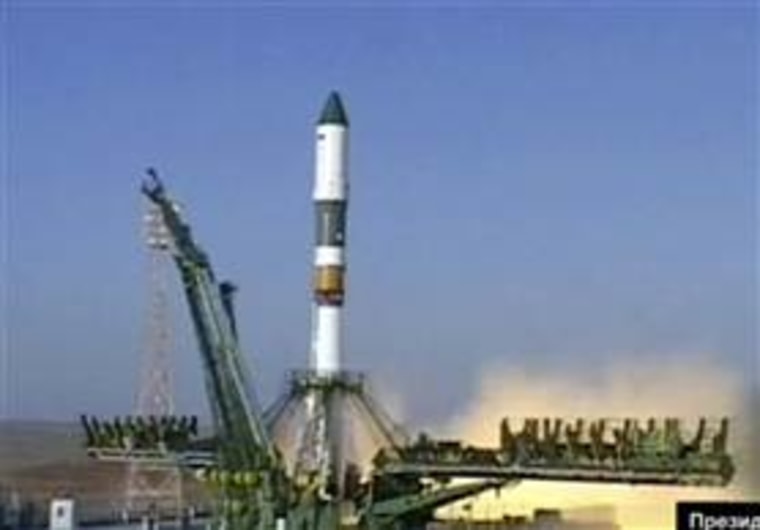An unmanned Russian supply ship bound for the International Space Station failed to reach its planned orbit Wednesday, and pieces of it fell in Siberia amid a thunderous explosion, officials said.
A brief statement from Roscosmos, Russia's space agency, did not specify whether the Progress supply ship that was launched from the Baikonur cosmodrome in Kazakhstan had been lost.
But the state news agency RIA Novosti quoted Alexander Borisov, head of a the Choisky region in Russia's Altai province, as saying pieces of the craft fell in his area some 900 miles northeast of the launch site.
"The explosion was so strong that for 100 kilometers (60 miles) glass almost flew out of the windows," he was quoted as saying. Borisov said there were no immediate reports of casualties.
NBC News space analyst James Oberg, who spent 22 years at NASA's Johnson Space Center as a Mission Control operator and an orbital designer, said Borisov described the region as an inhabited agricultural (orchard) area, but since it's remote, and night had fallen, he had no information on damage or casualties. He didn't expect to get that information until tomorrow.
Oberg said this region has experienced the falls of Russian rocket fragments for decades and is very sensitive to chemical pollution and other health hazards. Unburned propellant in the third stage, and a ton of hypergolic propellant in the cargo ship, could indeed make a respectable explosion, either on impact or after being ignited high in the air.
Other fallen Russian rockets have made impressive craters when they've fallen, but so far, nobody is known to have been hurt or killed in this incident.
The Russian Emergencies Ministry and Roscosmos officials could not be reached for comment.
According to Oberg, one source said that data in the Russian Federation rocket-space branch RF shows the divergence of space truck from the orbit occurred because it did not have time to collect the necessary orbital speed.
The source stressed that the cargo ship at 325 seconds was not separated from the third step of carrier rocket "Soyuz." After this, having partially burnt in the dense layers of the atmosphere, the unit fell in the Altai mountains.
The space agency statement confirmed the third stage of the rocket firing the ship into space had failed at 325 seconds into the launch.
The ship was carrying more than 2.5 tons of supplies, including oxygen, food and fuel. Since the ending of the U.S. space shuttle program this summer, Russian spaceships are a main supply link to the space station.
There are six astronauts aboard the International Space Station, which orbits 220 miles above the Earth. They are Russians Andrei Borisenko, Alexander Samokuyayev and Sergei Volkov, Americans Michael Fossum and Ronald Garan and Satoshi Furukawa of Japan.
"The supplies aboard the space station are actually pretty fat" after the resupply mission by space shuttle Atlantis in July, NASA spokesman Kelly Humphries said from Houston. "So we don't anticipate any immediate impact to the crew."
Humphries stressed that NASA was waiting to get more details from Russian space officials on what actually happened.
The Interfax news agency cited a Russian space analyst, Sergei Puzanov, as saying the space station had supplies already aboard that could last two to three months and "the situation with the loss of the Progress cannot be called critical."
In July of 2010, a Progress supply ship failed in its first automatic docking attempt due to equipment malfunction, but was connected with the orbiting laboratory two days later.
Marcia Dunn contributed to this report from Cape Canaveral, Fla.
